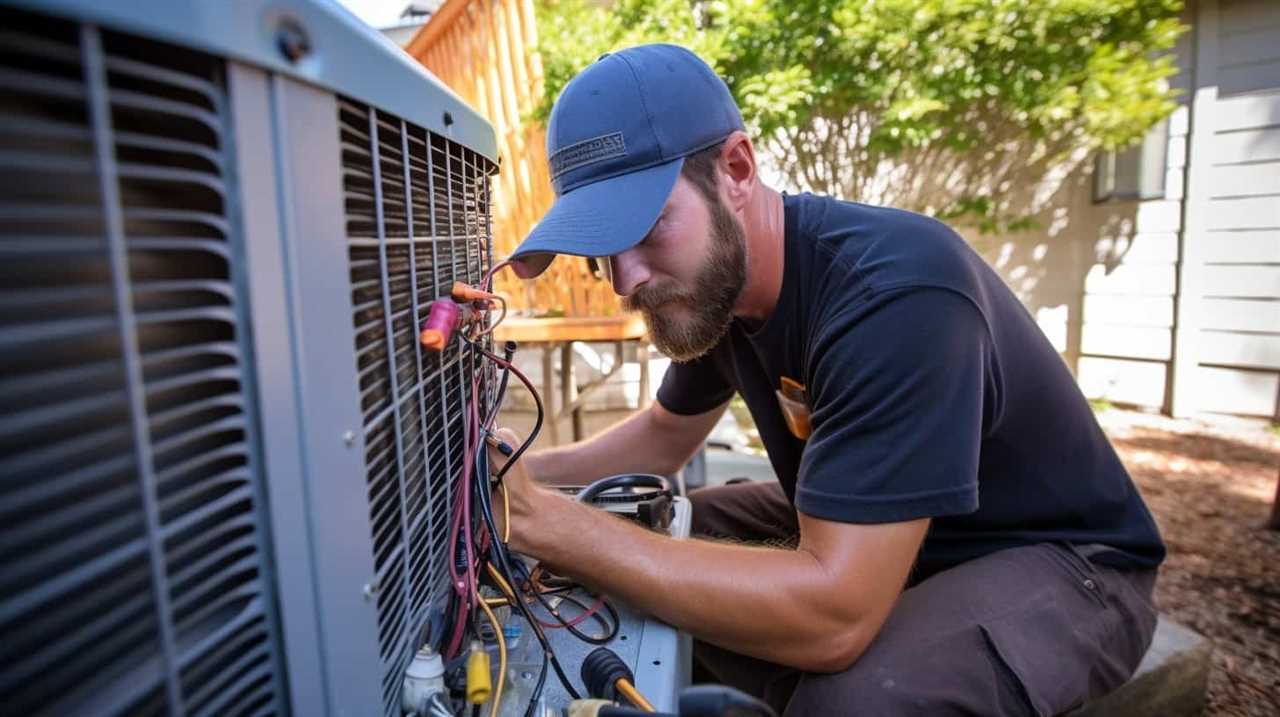Are you aware that heat pumps are more energy efficient compared to traditional heating and cooling systems? In fact, they have the potential to decrease energy usage by as much as 50%!
At our website, we’re here to bust the myths surrounding heat pumps and sustainable home architecture. Join us as we explore the truth about heat pump efficiency, debunk common misconceptions, and delve into the environmental benefits of this innovative technology.
Get ready to discover how heat pumps are revolutionizing modern sustainable architecture.
Key Takeaways
- Heat pumps can reduce energy consumption by up to 50%.
- Heat pumps significantly reduce carbon emissions compared to traditional systems.
- Heat pumps can be seamlessly integrated into modern sustainable architecture.
- Heat pumps offer long-term cost savings despite higher upfront costs.
The Truth About Heat Pump Efficiency
We’ve discovered that heat pump efficiency can vary significantly depending on factors such as climate and installation quality.

When it comes to heat pump energy consumption, it’s important to consider your specific climate conditions. In colder climates, heat pumps may struggle to extract heat from the air, resulting in higher energy consumption. On the other hand, in milder climates, heat pumps can operate more efficiently, resulting in lower energy usage.
Additionally, the quality of installation plays a crucial role in heat pump cost effectiveness. A properly installed heat pump will ensure optimal performance and energy efficiency. By choosing a reputable installer and considering your climate, you can maximize the benefits of your heat pump and minimize energy consumption.
Now, let’s delve into debunking common myths about heat pump performance.
Debunking Common Myths About Heat Pump Performance
Let’s debunk common myths about the performance of heat pumps.

One common myth is that heat pumps require frequent maintenance. In reality, heat pumps are known for their low maintenance requirements. Regular maintenance, such as cleaning filters and checking refrigerant levels, can help ensure optimal performance. However, compared to other heating and cooling systems, heat pumps generally require less maintenance.
Another myth is that heat pumps are expensive to operate. While the upfront cost of installing a heat pump can be higher than other systems, the long-term energy savings can make up for it. Heat pumps are highly efficient and can reduce energy consumption, resulting in lower utility bills. Additionally, there are various heat pump options available to suit different budgets and needs.
How Heat Pumps Contribute to Sustainable Home Design
While there are many ways to incorporate sustainable features into home design, heat pumps play a significant role in promoting energy efficiency and reducing carbon emissions. Here are four reasons why heat pumps contribute to sustainable home design:
-
Heat Pump Technology Advancements: With advancements in heat pump technology, these systems have become more efficient and reliable than ever before. They can extract heat from the air, ground, or water, making them suitable for various climates and locations.

-
Energy Efficiency: Heat pumps are highly energy efficient, as they transfer heat instead of generating it. This means they require less electricity to operate, resulting in lower energy consumption and reduced utility bills.
-
Reduced Carbon Emissions: By utilizing renewable energy sources such as the air or ground, heat pumps significantly reduce carbon emissions compared to traditional heating and cooling systems. This helps combat climate change and contributes to a more sustainable future.
-
Benefits of Geothermal Heat Pumps: Geothermal heat pumps, specifically, provide even greater energy efficiency by utilizing stable ground temperatures for heating and cooling. They can also provide hot water, further reducing the need for additional energy sources.
Incorporating heat pumps into sustainable home design is a smart choice that not only benefits the environment but also provides long-term energy savings.

Exploring the Environmental Benefits of Heat Pump Technology
One of the key environmental benefits of heat pump technology is its ability to significantly reduce carbon emissions compared to traditional heating and cooling systems. Heat pumps are more energy-efficient and environmentally friendly because they don’t burn fossil fuels to generate heat. Instead, they transfer heat from the air, ground, or water to provide heating or cooling. This process consumes less energy and emits fewer greenhouse gases, making heat pumps a sustainable choice for homeowners.
Moreover, heat pumps have a lower carbon footprint than traditional heating systems because they operate at higher efficiencies. This means that they can provide the same level of comfort while using less energy, resulting in reduced carbon emissions.
In addition to their environmental benefits, heat pumps are also cost-effective in the long run. Although the upfront cost may be higher, the energy savings over time make heat pumps a financially sensible option. When comparing heat pumps to traditional heating systems, their efficiency, reduced carbon emissions, and long-term cost savings make them a compelling choice for sustainable home architecture.
Integrating Heat Pumps in Modern Sustainable Architecture
We can seamlessly integrate heat pumps into modern sustainable architecture to enhance energy efficiency and reduce environmental impact. Here are four reasons why heat pump installation and maintenance are essential in sustainable home design:

-
Energy efficiency: Heat pumps are highly efficient, using renewable energy sources like air, water, or geothermal heat to generate heat or cool a space. This reduces the reliance on fossil fuels and lowers carbon emissions.
-
Cost savings: Heat pumps can significantly reduce energy consumption, resulting in lower utility bills. They also require less maintenance compared to traditional heating and cooling systems.
-
Environmental friendliness: Heat pumps produce fewer greenhouse gas emissions compared to conventional heating systems. They also utilize natural resources, such as air or ground heat, making them a sustainable choice for homeowners.
-
Longevity: With proper maintenance, heat pumps can have a lifespan of up to 15 years or more, ensuring long-term energy efficiency and cost savings.

Frequently Asked Questions
Are Heat Pumps Suitable for All Types of Climates?
Heat pumps are suitable for all types of climates. They provide efficient heating and cooling, reducing energy consumption and environmental impact. We’ve found that heat pumps are a sustainable and cost-effective solution for homes in any climate.
Can Heat Pumps Be Used as the Sole Source of Heating and Cooling in a Home?
Yes, heat pumps can be used as the sole source of heating and cooling in a home. They are highly efficient, reducing energy consumption by up to 50% compared to traditional systems. The benefits are numerous, making them a sustainable choice for any climate.
Do Heat Pumps Require a Lot of Maintenance and Upkeep?
Heat pumps require regular maintenance to ensure optimal efficiency. However, with proper care, they can be a reliable and efficient heating and cooling option for a sustainable home.
How Do Heat Pumps Compare in Terms of Cost to Traditional HVAC Systems?
Heat pumps offer significant cost savings compared to traditional HVAC systems due to their higher energy efficiency. They are a more sustainable option for heating and cooling homes, making them a worthwhile investment in the long run.

Are There Any Government Incentives or Rebates Available for Installing a Heat Pump in a Sustainable Home?
There are government incentives and energy rebates available for installing a heat pump in a sustainable home. These incentives can help offset the cost of installation and make it a more affordable option.
Conclusion
In conclusion, heat pumps aren’t only efficient and effective, but they also play a vital role in sustainable home architecture. By busting myths and debunking misconceptions, we can see the true potential of heat pump technology.
Like a hidden gem, heat pumps seamlessly integrate into modern sustainable homes, offering environmental benefits and contributing to a greener future. Embracing heat pumps is like stepping into a blooming garden, where energy efficiency and sustainability thrive.









